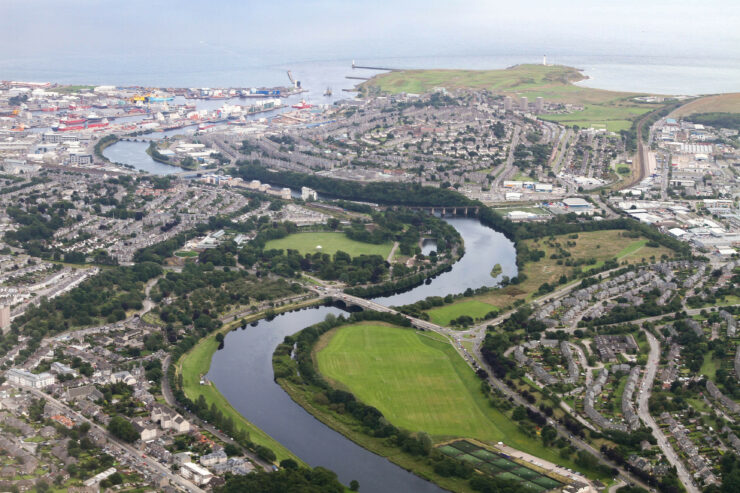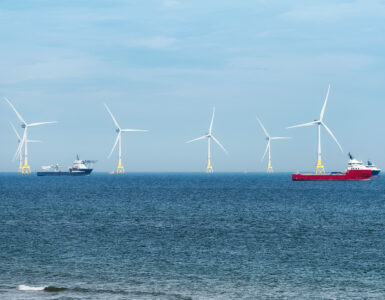Aberdeen wasn’t always “Europe’s Oil Capital”. It was only 60 years ago when oil was discovered in the North Sea and Aberdeen made the drastic change from fishing and shipbuilding to the fossil fuel industry.
Why?
To adapt to the growing and changing world around them. Within 11 years of the discovery of North Sea oil, Aberdeen’s population grew, and incomes soared. As we step into the mid-2020’s and realise the true impacts of the fossil fuel industry, Aberdeen has a leading role to play in transforming again to secure cleaner and greener energy sources.
Changes in understanding and technology
Technology has completely transformed the world around us and how we live our lives. It was just 140 years ago that the car was invented by engineer Carl Benz. At the same time, other industries flourished, using oil, gas and coal for fuel and power. Oil transformed our lives and literally fuelled the industrial revolution. Unfortunately, we are now realising that not all the impacts were positive.
We now know that burning fossil fuels like oil has a significant impact on human health and the environment.
We now know that burning fossil fuels like oil has a significant impact on human health and the environment. There is clear evidence highlighting that they are one of the largest causes of rising carbon emissions, resulting in climate change. Recent health studies also suggest that burning fossil fuels is responsible for making conditions like asthma worse too.
So why don’t we just stop using fossil fuels like oil? Well, this is the plan, but it is a little more complex than stopping immediately. If we were to stop using fossil fuels tomorrow, the world we know would grind to a halt; we’d see widespread power cuts affecting everything that needs electricity. We wouldn’t be able to charge our phones, watch telly, or even access the internet without the energy we currently get from burning fossil fuels. Within days our cars, trucks, trains and planes would come to a standstill as our fuel supplies ran out. Even our electric cars would struggle to get a charge, as much of the electricity they need comes from burning fossil fuels.
As society stands at present, we can’t just stop using fossil fuels. So, how do we transition smoothly into a future powered by clean, renewable energy?
What is the energy transition?
The energy transition is a global effort to shift from an energy mix based on fossil fuels to sources of energy that produce little to no carbon emissions such as solar, wind, nuclear and hydrogen power. This means electrifying our energy consumption, for example, replacing diesel and petrol-powered cars with electric ones, and generating the electricity they need from renewable sources. It also means increasing the amount of renewable power used in our electricity grids and improving our energy efficiency, for example, by better insulating our homes.
The National Grid also suggests that as we move towards using electric cars and electric heating systems, our demand for electricity will increase by 50%
However, it isn’t as easy as immediately switching from a gas oven to an electric one, we need to consider where our electricity is coming from. In the UK, burning fossil fuels makes up around 36% of our electricity generation. The National Grid also suggests that as we move towards using electric cars and electric heating systems, our demand for electricity will increase by 50%. To successfully remove fossil fuels and cover the increased demand, we need to upgrade our electricity grid and invest time and resources into building the infrastructure for renewables.
In 2020, for the first time, renewable sources of energy made a greater contribution to the UK power grid than fossil fuels.
You will be glad to hear, that we have already started this process. Since the beginning of the 21st century, the UK has been transitioning away from a predominantly coal-powered electricity grid to include other sources of energy such as gas, nuclear, and renewables like solar, hydro, tidal and wind. In the past five years, we’ve seen new tidal turbines in Orkney and plans for new hydroelectric dams. In 2020, for the first time, renewable sources of energy made a greater contribution to the UK power grid than fossil fuels. Following this, in 2021, the UK government set an ambitious target to decarbonise or remove carbon emissions from the power grid by 2035. But, if the UK is hoping to reach Net Zero by 2050, we need to do even more.
What does this mean for Aberdeen?
Aberdeen already transformed itself when the fossil fuel industry boomed and it’s in the process of transforming again. Historically, the Granite City has been a hub for oil and gas production with more than 65,000 of 75,000 jobs in Scotland based in Aberdeen or Aberdeenshire. As global energy demand changes and we transition to cleaner energy, Aberdeen has responded to the call by building a new, 40-hectare Energy Transition Zone (ETZ). This new ETZ will repurpose the once fossil fuel-centred hub to focus on renewables and help thousands of people retrain into Green Jobs.
As global energy demand changes and we transition to cleaner energy, Aberdeen has responded to the call by building a new, 40-hectare Energy Transition Zone (ETZ). This new ETZ will repurpose the once fossil fuel-centred hub to focus on renewables and help thousands of people retrain into Green Jobs.
The new ETZ will act as a centre for low-carbon activity and include a new marine port, a skills campus to create jobs in renewable energy, and production centres for hydrogen and offshore wind power. The Energy Transition Zone will help create the infrastructure to retrain skilled workers and invest in innovative technology that will make Aberdeen the new centre for clean energy in Europe.
The city of Aberdeen has already seen some big changes, with new offshore wind farms visible from the beach and hydrogen-powered buses driving down Union Street. The Energy Transition Zone is hoping that their campus and Aberdeen will lead the rest of Scotland and the UK by example to encourage investment in cleaner energy and help us to reach net zero. Before we invented the motorcar, it was hard to imagine a world without horses to get around. In your lifetime we’ll likely see changes as big as this as we move from fossil fuels to green electricity.
What part do you think you’ll play as we move into this clean, green world?












